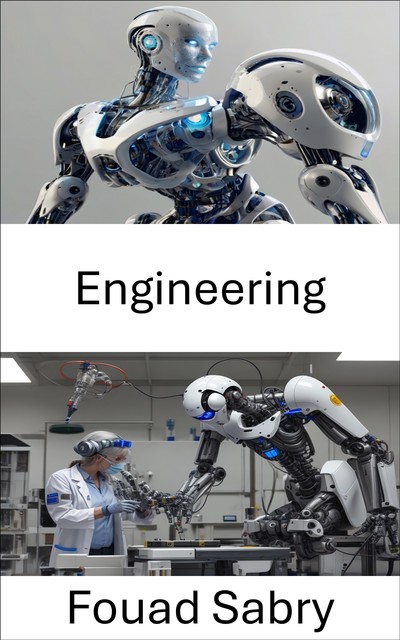We gebruiken cookies om de ervaring met de Bookmate-website en onze aanbevelingen te verbeteren.
Lees onze cookiebeleid voor meer informatie.
Lees onze cookiebeleid voor meer informatie.
Accepteer alle cookies
Cookie-instellingen
Fouad Sabry
Engineering
Impressie
Voeg toe aan boekenplank
Al gelezen
Meld een fout in het boek
Delen
Facebook
Twitter
Koppeling kopiëren
Engineering-This chapter introduces engineering as the backbone of technological progress, discussing its principles, methodologies, and realworld applications in robotics
Biomedical Engineering-Explore how biomedical engineering merges technology with biology to create solutions for medical devices, prosthetics, and healthrelated innovations
Computing-Delve into the critical relationship between computing and engineering, focusing on how computational systems enhance robotics and automation
Computer Science-Learn the key role computer science plays in software development, machine learning, and robotics, shaping the future of artificial intelligence
Control Engineering-This chapter examines how control systems are designed to manage robotic systems' behavior, ensuring precision and efficiency in automation
Electrical Engineering-Discover how electrical engineering powers robots and smart systems, covering circuits, sensors, and energy management crucial to robotic operation
Mechanical Engineering-Learn about the mechanical foundations of robotics, including the design and function of moving parts, structure, and materials for durable robots
Computer Engineering-Understand the fusion of computer science and electrical engineering in the development of the hardware and software that drives robotics
Machine-This chapter explores the machinery used in robotics, from mechanical components to automation tools that are foundational to intelligent machines
Hydraulic Engineering-Dive into the world of hydraulics, studying fluid dynamics and their applications in robotics, especially for systems requiring highforce motion
Bachelor of Engineering-Gain an understanding of what the Bachelor of Engineering degree entails, including the core competencies and pathways it offers for aspiring engineers in robotics
Engineering Physics-This chapter explains the physical principles that underpin engineering, exploring forces, energy, and materials critical to robotics design
History of Technology-Trace the evolution of technology and its influence on engineering, shedding light on past innovations that have paved the way for robotics today
Manufacturing Engineering-Learn how manufacturing processes are optimized for robotic production, focusing on efficiency, precision, and scalability in industrial settings
Architectural Engineering-Discover the intersection of architecture and engineering in designing spaces for robotics and automation systems in modern structures
History of Engineering-Explore the rich history of engineering, from its ancient roots to contemporary advancements that have shaped robotics and its applications
Industrial Engineering-This chapter covers the role of industrial engineering in optimizing systems and processes, crucial for developing efficient robotic systems
Electronic Engineering-Dive into the electronics behind robotics, including circuits, microcontrollers, and sensors essential for robotic operation
Industrial and Production Engineering-Learn how industrial engineering principles contribute to designing production systems that integrate robotics for improved productivity
History of Mechanical Engineering-Trace the development of mechanical engineering and its contributions to robotics, focusing on machinery design, tools, and automation
Biochemical Engineering-This chapter explores the integration of chemical engineering principles into robotics, focusing on bioreactors, sensors, and biorobotics applications
Biomedical Engineering-Explore how biomedical engineering merges technology with biology to create solutions for medical devices, prosthetics, and healthrelated innovations
Computing-Delve into the critical relationship between computing and engineering, focusing on how computational systems enhance robotics and automation
Computer Science-Learn the key role computer science plays in software development, machine learning, and robotics, shaping the future of artificial intelligence
Control Engineering-This chapter examines how control systems are designed to manage robotic systems' behavior, ensuring precision and efficiency in automation
Electrical Engineering-Discover how electrical engineering powers robots and smart systems, covering circuits, sensors, and energy management crucial to robotic operation
Mechanical Engineering-Learn about the mechanical foundations of robotics, including the design and function of moving parts, structure, and materials for durable robots
Computer Engineering-Understand the fusion of computer science and electrical engineering in the development of the hardware and software that drives robotics
Machine-This chapter explores the machinery used in robotics, from mechanical components to automation tools that are foundational to intelligent machines
Hydraulic Engineering-Dive into the world of hydraulics, studying fluid dynamics and their applications in robotics, especially for systems requiring highforce motion
Bachelor of Engineering-Gain an understanding of what the Bachelor of Engineering degree entails, including the core competencies and pathways it offers for aspiring engineers in robotics
Engineering Physics-This chapter explains the physical principles that underpin engineering, exploring forces, energy, and materials critical to robotics design
History of Technology-Trace the evolution of technology and its influence on engineering, shedding light on past innovations that have paved the way for robotics today
Manufacturing Engineering-Learn how manufacturing processes are optimized for robotic production, focusing on efficiency, precision, and scalability in industrial settings
Architectural Engineering-Discover the intersection of architecture and engineering in designing spaces for robotics and automation systems in modern structures
History of Engineering-Explore the rich history of engineering, from its ancient roots to contemporary advancements that have shaped robotics and its applications
Industrial Engineering-This chapter covers the role of industrial engineering in optimizing systems and processes, crucial for developing efficient robotic systems
Electronic Engineering-Dive into the electronics behind robotics, including circuits, microcontrollers, and sensors essential for robotic operation
Industrial and Production Engineering-Learn how industrial engineering principles contribute to designing production systems that integrate robotics for improved productivity
History of Mechanical Engineering-Trace the development of mechanical engineering and its contributions to robotics, focusing on machinery design, tools, and automation
Biochemical Engineering-This chapter explores the integration of chemical engineering principles into robotics, focusing on bioreactors, sensors, and biorobotics applications
meer
420 afgedrukte pagina’s
- Oorspronkelijke uitgave
- 2025
- Jaar van uitgave
- 2025
- Uitgeverij
- One Billion Knowledgeable
Hebt u het al gelezen? Wat vindt u ervan?
👍👎
fb2epub
Sleep je bestanden hiernaartoe
(maximaal 5 per keer)


